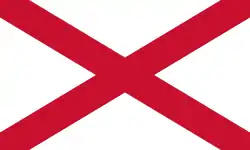saltire
English
WOTD – 30 November 2016


Saint Patrick's Cross, a red saltire (sense 1) on a white background
Etymology
From Middle French saultoir (“stile, saltire”) (compare French sautoir (“saltire”)), from sauter (“to jump, to leap”) + -oir (“suffix forming objects”), from Latin saltare (“to dance, to jump”) + -orium, -oria.
Pronunciation
- (Received Pronunciation) IPA(key): /ˈsæl.taɪə/, /ˈsɔːl-/
- Hyphenation: sal‧tire
Noun
saltire (plural saltires)
- (heraldry) An ordinary (geometric design) in the shape of an X. It usually occupies the entire field in which it is placed.
- The Saint Andrew's cross, the flag of Scotland.
- 2011 October 1, Tom Fordyce, “Rugby World Cup 2011: England 16 – 12 Scotland”, in BBC Sport, archived from the original on 26 September 2016:
- But the World Cup winning veteran's left boot was awry again, the attempt sliced horribly wide of the left upright, and the saltires were waving aloft again a moment later when a long pass in the England midfield was picked off to almost offer up a breakaway try.
- 2014 September 16, Ian Jack, “Is this the end of Britishness?”, in The Guardian, London, archived from the original on 18 April 2016:
- It was early August. In the Borders, there were few signs yet of a campaign that could take Scotland out of the United Kingdom. A large Y-E-S hung in separate letters from a tree on the road from Coldstream to Kelso. There wasn't a N-O to match it, but Kelso town hall flew both the saltire and the union jack.
-
Synonyms
- (heraldry): crux decussata
- (flag of Scotland): Saint Andrew's cross
Translations
Saint Andrew's cross — see Saint Andrew's cross
This article is issued from Wiktionary. The text is licensed under Creative Commons - Attribution - Sharealike. Additional terms may apply for the media files.